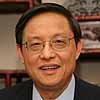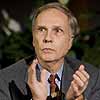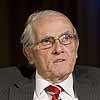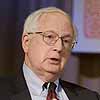|
As major powers with worldwide influence, China and the United States have contributed greatly to world peace, stability and development. The implications of their bilateral relations go well beyond these two countries.
Zhou Wenzhong
(Chinese Ambassador to the United States, 2005-present)

Over the past three decades, China and the United States have gained an increasingly clear understanding of the nature of their relations. Today, they regard each other both as stakeholders and as constructive partners. They have strengthened cooperation in various fields including trade, culture, science and technology and international affairs. They have also reached consensus on how to deal with disputes. Both countries believe that they should solve the problems in their bilateral relations through dialogue instead of confrontation. To date, they have put in place nearly 60 dialogue mechanisms, which play a significant role in facilitating the two countries' communication. China hopes President-elect Barack Obama's adjustments of America's domestic and foreign policies will be conducive to world peace and development. It will continue to work with the United States to promote the healthy and stable development of China-U.S. relations.
Winston Lord
(U.S. Ambassador to China, 1985-1989)

The key challenge in our relations with China is to have this strategic relationship, not in terms of military alliance, but in terms of two major powers, an emerging major power and an established one, talking in conceptual and strategic and broad terms. We have an agenda beyond the inevitable frictions that have arisen on human rights, Taiwan, Tibet, trade and so on. Therefore, not only should the economic dialogue [China-U.S. Strategic Economic Dialogue] continue, but we also need to continue and expand even further what the Bush administration has done well on, namely the Deputy Secretary of State Dialogue [China-U.S. Strategic Dialogue] on regional and global issues, and get to know each other's intentions on the military level.
James Lilley
(U.S. Ambassador to China, 1989-1991)

I think the Strategic Economic Dialogue started in December 2006 is probably the most significant move that has been made by the Bush administration in terms of China policy, for two basic reasons. One is the show of power in terms of U.S. Cabinet secretaries going to China and Chinese coming to the United States. But underneath that, even more important to me is switching the emphasis from military strategy to economic strategy. It almost foresaw the problems that are running today.
J. Stapleton Roy
(U.S. Ambassador to China, 1991-1995)

In 1993, the perception of China in the United States was about as far off the mark as I've ever seen in nearly 45 years in the diplomatic service. I would discuss this openly in my regular meetings with the American press and they described the factors that caused them to write the type of stories that would not give an accurate picture to Americans. Their editors didn't want the type of stories that dealt with the economic progress and things like that. If they wrote about human rights problems, they got page-one treatment. This was the way the market for news in the United States operated. Today I think we're doing much better.
Governments need to behave with a sense of the importance of this relationship, and government representatives need to display the same dedication and determination to keep the relationship on the right track.
James Sasser
(U.S. Ambassador to China, 1996-1999)

Number one, I would tell the new [U.S.] ambassador [to China]: Keep a sense of humor, and don't take yourself too seriously. Number two, I would tell him or her that you probably will be in, if not the most important, one of the most important countries of the 21st century. You have an obligation to work diligently to try to build a relationship to the mutual benefit of both countries. Number three, I would tell them to build trust. Never shade the truth, and never tell an untruth. If you can't disclose, just be quiet. So the most important thing I think is trust, maturity and keeping a sense of humor.
Joseph Prueher
(U.S. Ambassador to China, 1999-2001)

The issues that we have in the world-AIDS, pollution, economy, disease, health care and environmental issues-are not going to yield solutions without at least having China and the United States working together to solve these problems.
Clark T. Randt, Jr.
(U.S. Ambassador to China, 2001-present)

The relationship is becoming so broad and deep. As the world gets more complicated, our interdependence and complementariness become even more important. The significant common interests between China and the United States are going to expand rather than contract. We both want peace. We want our citizens to be prosperous. So we need economies to work well. I am very proud of the fact that we are leaving U.S.-China relations in much better shape than we got eight years ago.
(With reporting by Chen Wen, New York) | .jpg)
.jpg)